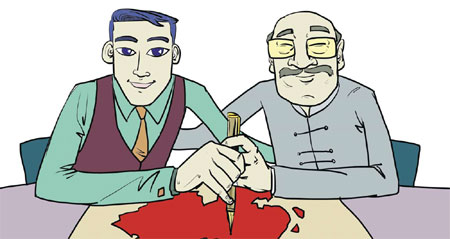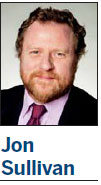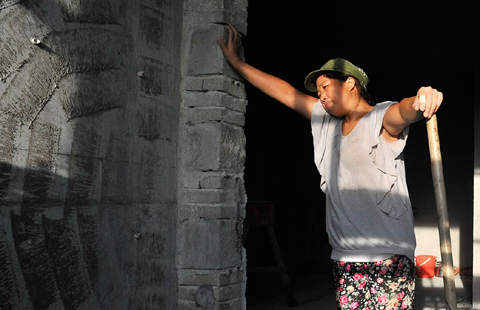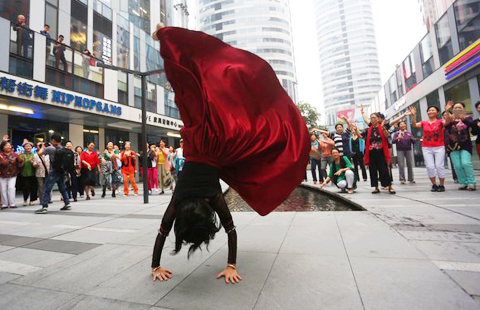Benefits from strange bedfellows
Updated: 2014-09-26 08:39
By Jon Sullivan(China Daily Europe)
|
|||||||||||


Cooperation between academics and journalists can work wonders in telling world about China
Academics specializing in contemporary China and journalists reporting on China's political, economic and social development share a common goal: to create and disseminate knowledge about the world's second-largest economy.
However, their very different approaches to achieving similar aims have given rise to a relationship that is often characterized as awkward and strained.
Journalists and academics are strange bedfellows in the best of times. The media have played a leading role in the critical narrative about academics disconnected from the real world; academics scorn the media's tendency to dumb down and sensationalize.
But developments in the two fields - particularly the growing pressure on academics to throw themselves into public debate and demonstrate the impact of their work on society - are demanding closer and more frequent interactions.
When it comes to China, the need for academics and journalists to communicate with each other effectively is hugely important. It is through the media that the public generally receives information about China, and erroneous or unnuanced views can quickly become the conventional wisdom.
Since many journalists reporting on China are generalists rather than China specialists per se, the depth and gradation of China scholars' understanding can provide a corrective that journalists welcome and readers benefit from.
Public interest in China is strong and will continue to be driven by the country's expanding global engagement and increasing global significance. To the extent that media discourse and "popular geopolitics" have an effect on public opinion and policymakers, it is crucial that China scholars contribute their perspectives to public discourse on China.
Problematic media narratives, sometimes playing to negative stereotypes, can quickly become the basis of popular misconceptions about China. It is vital then that we understand the underlying causes of frustrations that threaten to hinder relationships between academia and the media. And by identifying these obstacles, we can find ways to improve the efficiency of the relationship.
This is what I set out to do through two surveys into the nature of interactions of scholars and journalists within my own field of China studies: one set of questions to analyze academics' experiences and attitudes toward working with the media, and another set for the correspondents. The full results will be published in a forthcoming paper in The China Quarterly.
For the academics, the biggest barrier to media engagement was receiving interview requests at unreasonably short notice. This left academics feeling like nothing more than "space-fillers", the target of dozens of last-minute appeals from hard-pressed news assistants desperate to secure an academic, any academic, before deadline.
This is one example of the mixed messages that academics receive about the value of doing media work. If journalists really value scholarly contributions, why do they apparently expend little effort to identify appropriate experts and then leave it until the last minute to contact them? Why do they, in the words of one academic, treat interactions with scholars like a "late night booty call"?
The other major complaint among academics was being asked questions outside their area of expertise, and other problems included being pushed to oversimplify, being pushed to give strong opinions and being misquoted.
Others resented unpaid and unattributed background interviews that enabled journalists to "pass off hard-earned knowledge as their own".
This may reflect the key traits of the news media: short attention spans and churning news cycles; the preference for drama, human interest and storylines; and the conflation of opinion with analysis. The always-on, always-moving information environment demands a modus operandi that runs contrary to the values that academics inculcate through long years of training: considered reflection, attention to detail and acknowledgment of uncertainty.
Journalists, on the other hand, emphasized the value they place on time, availability and responsiveness. One journalist said: "Understanding the immediacy of media is fundamental for good cooperation between journalists and academics."
If messages are not promptly answered, they said, then journalists will move on.
The other sizeable gripe was over clarity. One reporter stressed the need for language without "jargon or academese", and another said stilted writing styles had a tendency to "bleed over into conversation". Limited column space is also a major issue, so academics need to be able to sum up the point they are making extremely succinctly.
It is clear then that much can go wrong. Relations are further tested by institutional barriers within academia that are a disincentive to scholars, particularly early-career researchers, from engaging with the media.
After all, opportunities for career progression center on peer review publications, securing research income and fulfilling teaching commitments. Despite universities' increasing consciousness of public relations and "brand building" activities, this incentive structure is unlikely to change much in the near term, restricting media work to well-established, tenured academics who can afford the luxury of doing it.
However, my research did reveal causes for optimism that the media and academia, including the next generation of academics, can work together fruitfully.
The enthusiasm among academics for media engagement is obvious. Despite already being relatively active, 44 percent of respondents said they would like to increase their media activities. Their motivations for doing so are refreshingly altruistic: 83 per cent did so to increase public understanding about China, while only 14 per cent said that receiving little or no credit from their institution for doing so was an issue.
The academic survey respondents came up with some constructive recommendations for the media, which would smooth the way to more productive relationships.
They asked journalists to invest more time in reading scholars' biographies before making an approach on a specific issue. One scholar asked journalists to "understand that it's not 1955 and that professors are under enormous pressure to do scholarly work, teach, and engage in service", responsibilities that cannot be dropped or easily moved at the last minute.
Several scholars suggested that making advance contact via email, sending questions before an interview and providing sufficient time for preparation would make a crucial difference to their ability and willingness to accept media requests.
Academics wanted continuing and personalized working relationships with journalists, rather than the "fast and utilitarian 'I am looking for a fast quote on a piece that is almost done' scenario." These channels of communications would leave the academic feeling there is an open door for occasionally sending unsolicited advice or a brief on a given issue.
There was plenty of encouragement from journalists for academics to reach out to them and build relationships. The main way journalists chose which academics to contact was to draw on their existing pool of contacts, or by noting appearances scholars made in other media and recommendations, both of which suggest a snowball effect: once an academic has started to do some media work, more will follow.
But this does not mean academics outside the circle are not invited to the party. Many journalists encouraged academics to be proactive in introducing themselves and their area of expertise. Several said they gladly received emails out of the blue from academics, and seniority or the prestige of the institution to which they belonged were not factors affecting their willingness to engage. Others said that any moves by scholars to make their research more freely accessible would be very well received.
The author is associate professor and deputy director of the China Policy Institute, University of Nottingham. He tweets at @jonlsullivan. The full results of his survey will appear in a forthcoming paper in The China Quarterly. The views do not necessarily reflect those of China Daily.
(China Daily European Weekly 09/26/2014 page12)
Today's Top News
UK to join airstrikes against IS in Iraq
Qatar forfeit basketball game
Russia turns to RMB to thwart Western sanctions
Express delivery sector opens up
China rebuffs EU on condemning life sentence
Emissions report tells only part of story, expert says
India triumphs in Mars mission
iPhone smugglers targeted
Hot Topics
Lunar probe , China growth forecasts, Emission rules get tougher, China seen through 'colored lens', International board,
Editor's Picks

|

|

|

|

|

|





